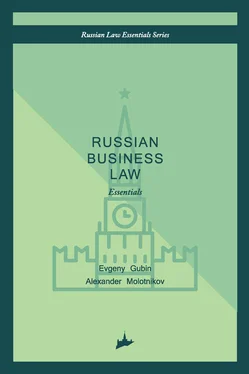Evgeny Gubin - Russian business law - the essentials
Здесь есть возможность читать онлайн «Evgeny Gubin - Russian business law - the essentials» — ознакомительный отрывок электронной книги совершенно бесплатно, а после прочтения отрывка купить полную версию. В некоторых случаях можно слушать аудио, скачать через торрент в формате fb2 и присутствует краткое содержание. Город: Moscow, Год выпуска: 2016, ISBN: 2016, Жанр: foreign_language, Юриспруденция, popular_business, на английском языке. Описание произведения, (предисловие) а так же отзывы посетителей доступны на портале библиотеки ЛибКат.
- Название:Russian business law: the essentials
- Автор:
- Жанр:
- Год:2016
- Город:Moscow
- ISBN:978-5-9904334-9-6
- Рейтинг книги:3 / 5. Голосов: 1
-
Избранное:Добавить в избранное
- Отзывы:
-
Ваша оценка:
- 60
- 1
- 2
- 3
- 4
- 5
Russian business law: the essentials: краткое содержание, описание и аннотация
Предлагаем к чтению аннотацию, описание, краткое содержание или предисловие (зависит от того, что написал сам автор книги «Russian business law: the essentials»). Если вы не нашли необходимую информацию о книге — напишите в комментариях, мы постараемся отыскать её.
Russian business law: the essentials — читать онлайн ознакомительный отрывок
Ниже представлен текст книги, разбитый по страницам. Система сохранения места последней прочитанной страницы, позволяет с удобством читать онлайн бесплатно книгу «Russian business law: the essentials», без необходимости каждый раз заново искать на чём Вы остановились. Поставьте закладку, и сможете в любой момент перейти на страницу, на которой закончили чтение.
Интервал:
Закладка:
The necessity for the application of the mentioned articles of FL on Transportation-Forwarding Activities is also confirmed by the supreme courts (see, for example, the Information Letter No. C5–7/UZ-886 dated March 5, 2003 of the Supreme Court of Arbitration of the RF "About the Federal Law On Transportation-Forwarding Activities).
The core codes for conducting entrepreneurship in Russia are:
i) The Civil Code of the Russian Federation
The CC of the RF consists of four parts, [20] In Russia, there is no uniform approach on how to name the components of the articles of legal acts. Usually the largest components of the articles are called “clauses, sections, or parts.” Thus in the CC of the RF and the Tax Code of the RF, larger components are called "sections," (each «section» corresponds to one federal law, which in total forms these codes). Sections/parts or clauses of the articles of legal acts can be divided into sub-clauses and paragraphs. Meanwhile, the parts of the articles can also be divided into clauses (that is, both the whole article and the «part» of the article can also be divided into "clauses"). Additionally, many secondary legal acts are divided into clauses, and articles therein are missing. In order to define how the concrete element of the article is correctly named, it is necessary to find (in the same legal act), references to an element of an article of the same level (see, for example, Clause 2 of Article 3 of the CC of the RF).
each of which is considered as a separate federal law. However, these four laws make a uniform code. Under the term “the civil code,” all four parts thereof are regarded. The numbering of all articles of the code is continuous.
The CC of the RF is the basis of the civil legislation which “defines the legal status of the participants of the civil turnover, the grounds of emergence, and the procedure of the implementation of property rights and other real rights, rights for the results of intellectual activity, and means of individualization (of intellectual rights) equated to them, regulates the relations connected with the participation of corporate organizations or with their management (the corporate relations), contractual and other obligations, and also other property and personal non-property relations based on equality, an autonomy of will, and property independence of participants,” (clause 1 of Article 2 of the Civil Code of the RF).
ii) The Civil Procedure Code of the RF
The Civil Procedure Code of the RF regulates the procedure of civil legal proceedings in the courts of general jurisdiction.
iii) The Arbitration Procedural Code of the RF
The Arbitration Procedural Code of the RF regulates the legal proceedings form in the arbitration courts. The arbitration courts in the Russian Federation administer jurisdiction in the sphere of entrepreneurial and other economic activity (Article of 1 Arbitration Procedural Code of the RF).
iv) The Tax Code of the RF
The Tax Code of the RF, as well as the CC of the RF, consists of several parts which represent separate federal laws, but collectively form a uniform code. However, unlike the CC of the RF, there are two parts (not four parts) in the Tax Code of the RF.
The Tax Code of the RF stipulates the basis of the legislation on taxes and levies which regulates "relations of power with respect to the establishment, introduction, and collection of taxes and levies in the Russian Federation, as well as the relations which arise in the process of exercising tax control, and appealing against acts of tax authorities and the actions (and inaction) of their officials, and imposing sanctions for the tax offences," (Article 2 of the Tax Code of the RF).
Other federal laws on taxes and levies have to correspond with the Tax Code of the RF (Clause 1 of Article 1 of the Tax Code of the RF).
v) The Land Code of the RF
The Land Code of the RF regulates the relations on the use and protection of lands in the Russian Federation.
The norm of the land law, as contained in other federal laws, in laws of the subjects of the Russian Federation have to correspond with the Land Code of the RF (paragraph 2, Clause 1 of Article 2 of the Land Code of the RF).
vi) The Labor Code of the RF
The Labor Code of the RF is the basic law regulating the relations between the employee and the employer, as well as between the employer and the state.
The norms of the labor law, as contained in other federal laws, have to correspond with the Labor Code of the RF (Part 3 of Article 5 of the Labor Code of the RF).
vii) The Criminal Code of the RF
The Criminal Code of the RF provides for criminal liability for serious offenses/crimes. The criminal liability for different deeds can be established only by the Criminal Code of the RF.
viii) The Criminal Procedure Code of the RF
The Criminal Procedure Code of the RF regulates the procedure for criminal legal proceedings in the courts.
ix) The Code of Administrative Offences of the RF
The Code of Administrative Offences of the RF provides for administrative responsibility for the deeds listed therein, and lists the bodies which are authorized to consider cases of administrative offenses. It also regulates the proceedings, as well as the execution of decisions on cases of administrative offenses.
Unlike the Criminal Code of the RF, the Code of Administrative Offences of the RF does not contain an exhaustive list of deeds which result in administrative responsibility. The structures of administrative offenses and sanctions thereof are fixed in other legal acts as well. Thus, part 1 of Article 34 of the FL on Protection of Competition provides for the possibility of compulsory liquidation of the organization, in case it was created without receiving a prior consent of antimonopoly authority, provided that the necessity of receiving such consent is defined by the law. Additionally, the administrative responsibility can be established by the laws of the subjects of the Russian Federation.
4.2.3. The Federal Laws
In addition to the codes which contain most general norms, the activities of the entrepreneurs in Russia are also regulated by the federal laws. Some of them are listed below:
i) The Federal Law on Joint Stock Companies,
ii) The FL on Limited Liability Companies,
iii) The FL on Registration,
iv) The FL on Advertising,
v) The FL on Licensing,
vi) Foreign Investment Law.
Sometimes, the word «legislation» does not only refer to laws, but also to any other legal acts. For example, Clause 6 of Article 1 of the Tax Code of the RF directly states: “The laws and other normative legal acts which are referred to in this Article shall hereafter in the text of this code be referred to as ‘tax and levy legislation.’ ”
Moreover, it is necessary to remember that legal acts such as the “On Railway Transport Charter of the Russian Federation,” (RTC) and the “The Charter of Motor and Urban Surface Electric Transport,” (MUSETC) are also federal laws, despite the existence of the word «charter» in their names. This type of a legal act as the charter, does not exist in Russia, whereas this word sometimes occurs in names of various acts (not only in federal laws). When determining the legal nature of a legal act, it is always necessary to refer to its type (federal law, decree, decision, etc.) and the adopting body thereof (The President of the RF, the Government of the RF, etc.). This determination is not made by the name of the legal act.
5. The Subordinate Legislation
5.1. Subordinate Legal Acts of Public Authorities
5.1.1. Acts of the President of the Russian Federation
The legal acts of the President of Russia follow federal laws in the hierarchy of legal acts. The acts of the President of Russia should not contradict to the Constitution of Russia and the federal laws (part 3 of Article 90 of the Constitution of Russia).
Читать дальшеИнтервал:
Закладка:
Похожие книги на «Russian business law: the essentials»
Представляем Вашему вниманию похожие книги на «Russian business law: the essentials» списком для выбора. Мы отобрали схожую по названию и смыслу литературу в надежде предоставить читателям больше вариантов отыскать новые, интересные, ещё непрочитанные произведения.
Обсуждение, отзывы о книге «Russian business law: the essentials» и просто собственные мнения читателей. Оставьте ваши комментарии, напишите, что Вы думаете о произведении, его смысле или главных героях. Укажите что конкретно понравилось, а что нет, и почему Вы так считаете.












